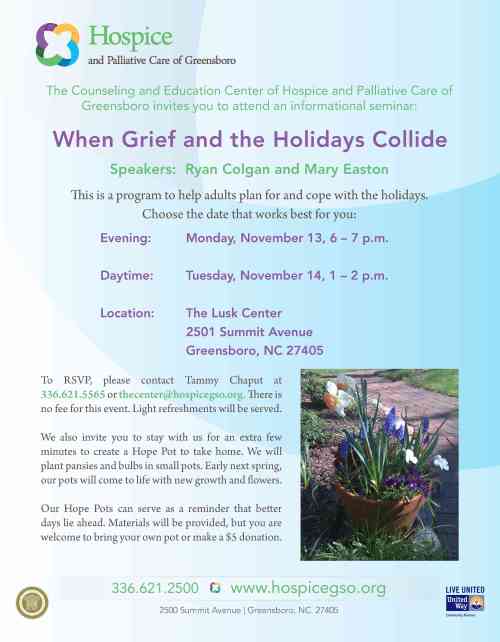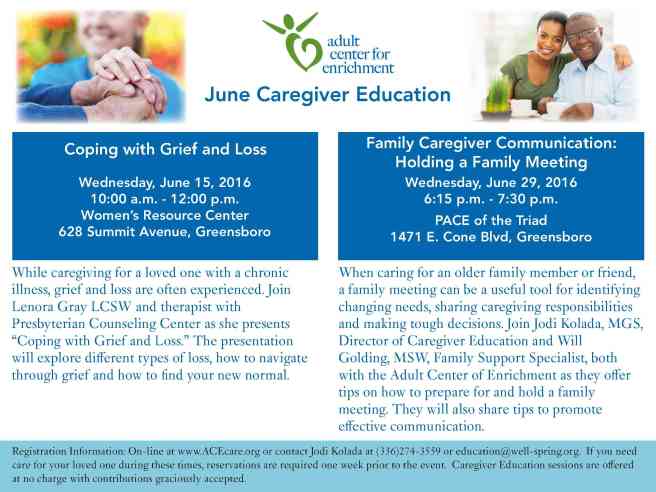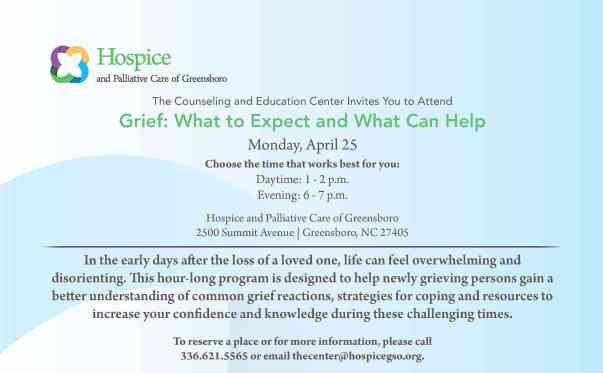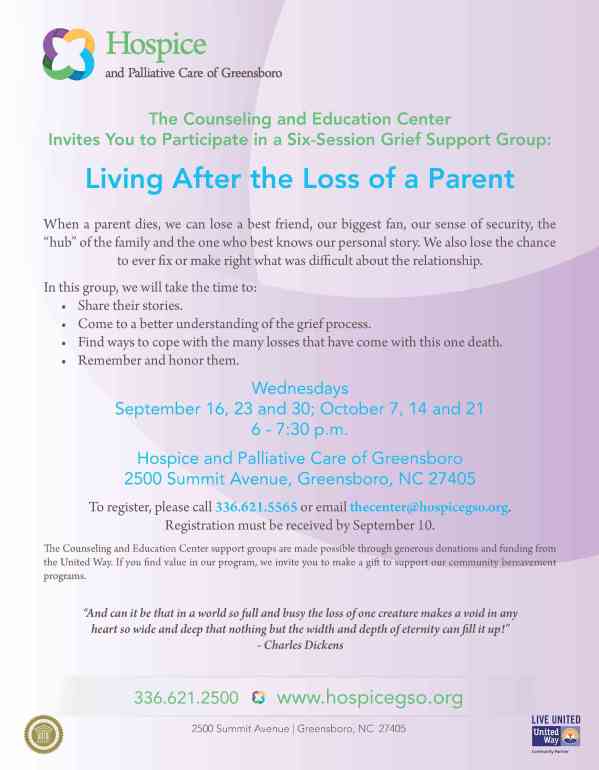Blogroll
- CATHI: Caregiver FAQs
- Center for Creative Aging-NC
- EMM FINANCIAL SERVICES INC
- Greensboro Public Library
- Guilford County Public Health Department
- Hospice and Palliative Care of Greensboro
- Mental Health Association in Greensboro
- NC Falls Prevention Coalition
- Piedmont Triad Council of Governments-Area Agency on Aging
- Senior Resources of Guilford
- Shepherd’s Center of Greensboro
- The Joint Master of Social Work Program NC A&T/UNCG
- Well-Spring Solutions
-
Join 42 other subscribers
Via Seniorline
Tweets by SeniorLineCategories
Category Archives: Grief
Image Image Image Image Image ImageAce Hosts Anticipatory Grief Class
“Anticipatory Grief” refers to a reaction that occurs before an impending loss. Are you experiencing a mix of emotions because your loved one has a chronic or terminal illness? Marcia Patterson Vanard LCSW will help you recognize and cope with anticipatory grief during this session. Marcia is the Director of the Counseling and Education Center at Hospice and Palliative Care of Greensboro. She provides grief counseling, educational presentations and consultations on end-of-life issues to individuals, families, and groups.
The class will be held Wednesday, August 19th from 10:30am-12:00pm at the Lusk Center, 2501 Summit Avenue, Greensboro.
Posted in Caregiver, Community, Greensboro, Grief, Guilford, Mental Health, North Carolina
Tagged Adult Center for Enrichment, anticapatory grief, Caregiver
What To Do When You Can’t Afford a Funeral?
Guest Post from Josh Slocum, FCA executive director, republished from Funerals.org
The most important thing to remember is that a meaningful, heartfelt memorial doesn’t need to cost more than your family can afford. Whether you spend $600 or $10,000, you’ll love and miss the deceased just as much. It’s the coming together of family and friends to laugh, cry, and love each other that makes a funeral meaningful, not the amount of money it costs.
And this is crucial: there is no charity or government organization that will pay off any debt you’ve accrued if you arrange a funeral that’s beyond your means. It’s your family’s responsibility to spend within its budget. Funeral homes are not required to let you pay in installments; many these days are asking for payment upfront. While this might seem frustrating, it’s a responsible business practice and it prevents many grieving people from falling into a financial trap when they’re not thinking clearly. Sweating the monthly bills six months after the death because the funeral payments are high does not, I assure you, help lift the burden of grief.
Here are some suggestions for creative way to economize without giving up the essential value of a final send-off. At the end of the article are links to a few organizations that may help contribute for the funerals of children in certain circumstances. It pays to call several funeral homes as many will do a service for a drastically reduced price if the deceased was a child.
1. Remember to shop around—Don’t just accept the price quote at the first funeral home you talk to, and don’t just assume the funeral home your family has always used is the best choice. In nearly any area of the country, the exact same funeral can cost thousands of dollars less at a competing business. Shopping around, at least by phone, may help you get the funeral you want for a lot less than you thought you would need to pay.
2. Many anatomical donation organizations will accept a body at no charge and will arrange for transportation to their facility at no cost to the family. If you have questions about the uses to which the body will be put, be sure to ask, and visit their websites. Most of these companies provide body parts for non-transplant purposes including research and medical training. There is usually no expense to the family, even for out-of-state shipping. The consent form should be explicit that the body will be surgically divided. Some body parts may be shipped outside the U.S. Most of these deal with both nonprofit and for-profit entities. Any unused or already-used body parts will be cremated and returned to the family when so requested although some of the end users dispose of tissue as medical waste. Some options include Anatomy Gifts Registry and ScienceCare. More can be found here.
3. Consider body donation to a medical school. You’ll be helping train the next generation of doctors who will be taking care of you, and depending on where you live, the cost could be minimal (transportation) to free. Most medical schools will return the cremated remains in one to two years after study if you request this beforehand.
4. Whether there’s government money to bury the poor (euphemistically called “indigent”) depends on the state. Some states have a budget for this. Others leave it up to the local county, city, or town. There is no rule of thumb. Click HERE for a list of what the states offer. If a family has no money, the first thing they should do is call the department of social services (or whatever their state calls the welfare office) to see if there’s an indigent burial/cremation program.
If your state or county offers help it’s not going to cover a full-service funeral with embalming, a public viewing, and associated ceremonies. The family is going to get a direct cremation or immediate burial at most. Some states won’t allow a family to add any of their own money, reasoning that if they can afford to do so, they don’t need the state’s help. Other states will allow families to add money for optional ceremonies up to certain limits.
Remember that you can organize a memorial service later at home, at church, in a social venue, etc.
5. You have the right to pick and choose only the funeral goods and services you want and can afford. You don’t have to buy an elaborate package. Sure, you may want a public viewing of the body and then a Mass of Christian Burial at the church afterward, but if you don’t have the money for it you alone are responsible for the bill.
6. Consider a home funeral. In most states it’s perfectly legal to complete the death certificate (with the doctor’s or medical examiner’s certification), file it, care for the body at home, and take it to the cemetery or crematory. Most families in this country did so routinely until the turn of the 20th century. The FCA national office can help guide families, or you can turn to the new book Final Rights: Reclaiming the American Way of Death for specific requirements in your state.
There are many meaningful ways to say goodbye to someone that have nothing to do with cost. I often tell callers the story of my grandmother Edith Slocum’s funeral. She had wanted cremation, but the daughters opted for the full embalming and formal ceremony at the request of a sister who hadn’t seen grandma in years. Looking back, I found the made-up-body-lying-in-state extremely artificial and uncomfortable. But the family reception afterward? One hell of a good party. We went back to Aunt Mary Ellen’s house where the grandkids made food while 70 people milled around telling stories about grandma’s legendary cheating at gin rummy. Most of them were getting tipsy off her favorite cocktail, which was no mean feat considering she liked the dreadful sloe gin fizz. My fondest memory is of mixing up tuna-pea macaroni salad with my cousin Kelly, crying and giggling at the same time.
Free urns for those in need—Memorial Gallery, a Seattle company that sells urns and cremation/remembrance jewelry, is kindly offering free, slightly blemished urns to those who can’t afford one. You must mention Funeral Consumers Alliance to receive this offer. Contact them at www.memorialgallery.com or call them at 1-253-649-0567. Let them know what style of urn would be appropriate (for example, masculine, feminine, child). They will select an urn and mail it to you free of charge.
ACE Offering Two Caregiver Education Events in October
Legal Planning and Family Caregiving: Wills and Powers of Attorney
Friday, October 18th, from 10am-11:15am
First Baptist Church
1000 W. Friendly Ave. Room 102
Greensboro, NC
Elder Law Clinic students from the Elon University School of Law will provide information about these key legal documents you need to know about as a family caregiver. Students will be presenting under the supervision of Hannah Vaughan, Practitioner-in-Residence at the Elder Law Clinic.
To register, please contact Jodi Kolada by October 14th at
(336) 274-3559 or jkolada@acecare.org as space is limited.
_______________________________________________________
Anticipatory Grief and Caregiving
Thursday, October 24th, from 10:30a-12pm
Women’s Resource Center of GSO,
628 Summit Ave
Greensboro, NC
During this session, Marcia Patterson Vanard, LCSW and Director of the Counseling and Education Center at Hospice and Palliative Care of Greensboro, will help caregivers recognize and cope with anticipatory grief. This refers to a reaction that occurs before an impending loss.
To register, please contact Jodi Kolada by October 21srt at
(336) 274-3559 or jkolada@acecare.org as space is limited.
_______________________________________________________
Both sessions are offered at no charge with contributions gratefully accepted. Please let ACE know if you need care for you loved one during this time as prior arrangements are required.
Posted in Caregiver, Education, Greensboro, Grief, Guilford, Legal
Tagged ACE, Adult Center for Enrichement, Caregiver, grief, Hospice and Palliative Care of Greensboro, Legal, POA, Powers of attorney, Wills
Anticipatory Grief
Anticipatory grief refers to a grief reaction that occurs before an impending loss. It’s common to grieve for the person you had in your life before Alzheimer’s, Parkinson’s, Cancer or another disease that is threatening to take your loved one from you.
- Prepare yourself mentally – Realize the grief you are feeling is real
- Take care of yourself
- Learn more about anticipatory grief and options available
- Seek out support through Hospice, local support groups, family and friends
- Take the time to create closure with your loved ones (embrace the times of clarity, create lasting legacies)
Additional resources about Anticipatory Grief:
Posted in Alzheimer's, Grief






